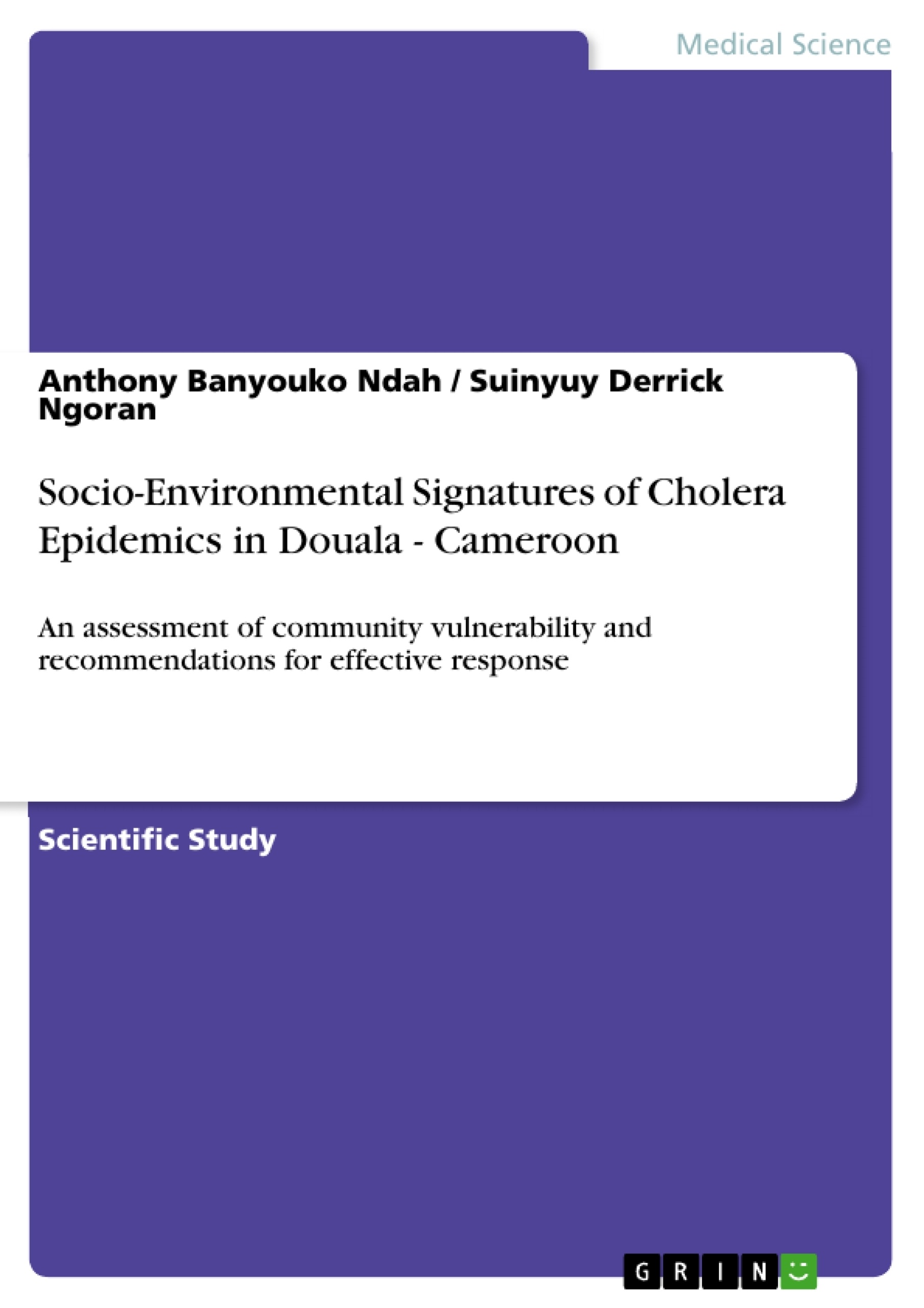This study is an enquiry into the socio-epidemiological characteristics of sections of the Douala municipal metropolis in Cameroon in the face of recurrent and increasingly large cholera outbreaks in Cameroon. The purpose is to provide vital insights into the extent and nature of vulnerability of the populations to cholera outbreaks, as well as provide a leeway for the effective identification of maximum risk areas and vulnerable populations so as to tailor limited response resources efficiently and effectively. The study establishes the following:1). Contrary to the popular belief that in a cholera endemic setting, the greatest burden is in the younger age groups (0-2 and 3-9), in the case of Douala, based on data of the last three epidemiological periods (2010, 2011 and 2012), the young adult / adult age groups (21-30 and 31–40 years) have been identified as the most vulnerable. 2). Concerning gender, males have been found to be far more vulnerable than females; 3). Social characteristics not commonly considered in public health strategies, including: attitudes towards hygiene and sanitation, limited knowledge of diseases and cholera transmission mechanisms, as well as magico-religious beliefs on the origins of cholera, are possibly the dominant causes of high vulnerability to cholera and/or serve as major hindrances to effective mitigation; 4). Cholera risk factors such as slum settlements, lack of proper social amenities and services for example potable water, drainage, waste collection, hygiene and sanitation facilities, are generally spread through out the Littoral Region and Douala in particular, though characterized by glaring unevenness constitute important risk facts but not direct causes of high vulnerability. Though there appears to be a direct relationship between the existence of risk factors and vulnerability, human attitudes and beliefs are the bridge linking these two concepts. Finally, an Integrated Cholera Management (ICM) framework has been proposed. This framework is intended to show the interconnected components in an ideal cholera management system in Cameroon.
Inhaltsverzeichnis (Table of Contents)
- INTRODUCTION
- The state of global cholera epidemiology
- The State of Cholera epidemiology in Douala, Cameroon
Zielsetzung und Themenschwerpunkte (Objectives and Key Themes)
This study investigates the socio-epidemiological characteristics of sections of the Douala municipal metropolis in Cameroon during recurrent and increasing cholera outbreaks. Its goal is to understand population vulnerability to cholera outbreaks, identify high-risk areas and vulnerable groups, and optimize limited response resources.
- Vulnerability of different age groups to cholera outbreaks in Douala.
- Gender disparities in cholera vulnerability.
- Influence of social factors like hygiene attitudes, disease knowledge, and magico-religious beliefs on cholera vulnerability.
- Impact of risk factors like slum settlements, lack of sanitation, and inadequate infrastructure on cholera vulnerability.
- Proposed Integrated Cholera Management (ICM) framework for Cameroon.
Zusammenfassung der Kapitel (Chapter Summaries)
- INTRODUCTION: This chapter presents a comprehensive overview of cholera, a bacterial disease caused by Vibrio cholerae, and its global epidemiology. It highlights the widespread impact of cholera in developing countries, particularly in areas with limited access to clean water and sanitation. The chapter also emphasizes the crucial role of environmental and hydrological factors, as well as climate patterns, in cholera outbreaks.
- The State of Cholera epidemiology in Douala, Cameroon: This chapter focuses on the specific situation of cholera in Douala, Cameroon, emphasizing its impact as a public health crisis and humanitarian disaster. It examines the prevalence of various infectious diseases, including cholera and malaria, in the Littoral Region and highlights the importance of cholera as a multi-causal and complex disease. It also provides data on cholera outbreaks in the region, particularly in Douala, from 1996 to 2005, showcasing the recurring nature of the disease.
Schlüsselwörter (Keywords)
This study focuses on cholera epidemiology, vulnerability, socio-environmental factors, public health, risk factors, Integrated Cholera Management (ICM), Douala, Cameroon, Littoral Region, Vibrio cholerae, sanitation, hygiene, environmental factors, climate change, disease transmission.
Frequently Asked Questions
Which age groups are most vulnerable to cholera in Douala?
Contrary to popular belief, data from 2010-2012 shows that young adults (21-30 and 31-40 years) are the most vulnerable groups in Douala, rather than young children.
Does gender play a role in cholera vulnerability in Cameroon?
Yes, the study found that males are significantly more vulnerable to cholera than females in the Douala region.
How do social beliefs influence cholera outbreaks?
Attitudes towards hygiene, limited knowledge of transmission, and magico-religious beliefs about the origins of cholera are major factors that increase vulnerability and hinder mitigation efforts.
What are the main environmental risk factors identified?
Key risk factors include slum settlements, lack of potable water, poor drainage, and inadequate waste collection and sanitation facilities.
What is the proposed Integrated Cholera Management (ICM) framework?
The ICM is a proposed framework for Cameroon that shows interconnected components needed for an ideal cholera management system, bridging infrastructure and human attitudes.
- Citar trabajo
- Mr. Anthony Banyouko Ndah (Autor), Suinyuy Derrick Ngoran (Autor), 2018, Socio-Environmental Signatures of Cholera Epidemics in Douala - Cameroon, Múnich, GRIN Verlag, https://www.grin.com/document/438250



